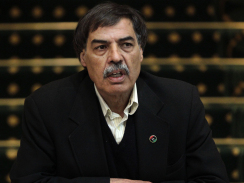 Libya’s opposition said it is discussing with allies the possibility of borrowing $2 billion in order to import food, medicine, fuel and possibly weapons to combat Muammar Qaddafi’s forces.
Libya’s opposition said it is discussing with allies the possibility of borrowing $2 billion in order to import food, medicine, fuel and possibly weapons to combat Muammar Qaddafi’s forces.
“The short term loans are an option on the table that we discussed with our friends” at a conference today in Qatar, Ali Tarhouni, the National Transitional Council’s finance minister said in an interview today in Benghazi. The borrowing may have a term of as long as two years and would be backed by Libyan assets frozen abroad, which could be used to reimburse the lenders once unlocked, he said.
“We immediately are trying to access $2 billion and this number could rise,” he said. “We should be able to access these funds to import medicine, food, fuel, even armaments, but we are concentrating on the first ones.” The council needs reserves of commodities and medicine to help areas “liberated from Qaddafi,” Tarhouni said.
The rebels’ transitional government is pressing the international coalition, led by the U.S., that has joined its struggle against Qaddafi to step up support. At the Qatar meeting today, the host nation’s Prime Minister Hamad bin Jasim Al-Thani said his country would “look into” supplying equipment to help the rebels defend themselves.
The coalition also said it is examining a “temporary financial mechanism” so the rebels can access government assets frozen abroad as part of sanctions against Qaddafi’s regime.
A dream came true
“I dreamt it would happen, but I did not expect it would happen,” said Ali Tarhouni, who left his job as an economics professor at the University of Washington to handle finances for the National Transitional Council.
Tarhouni, 60, said he last set foot in Libya in 1976, shortly after leaving to pursue a master’s and doctorate in economics at Michigan State University. From abroad, he watched the regime’s brutality.
On April 7, 1977, Qaddafi publicly hanged several opposition figures in Benghazi. In the ’80s, Tarhouni found his own name on one of Qaddafi’s hit lists, he said.
Tarhouni lived a “double life” for years, building an U.S. academic career while helping organize opposition to Qaddafi abroad.
When the uprising broke out on Feb. 17, he took a few days to organize his affairs, then returned to Libya.
“My plan now is to muster all the resources under my control — finances, oil and other things to liberate the rest of Libya,” he said.
Bloomberg, CBS

Leave a Reply
You must be logged in to post a comment.